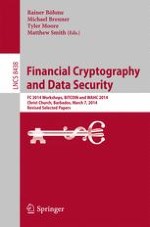2014 | OriginalPaper | Chapter
Fair Two-Party Computations via Bitcoin Deposits
Authors : Marcin Andrychowicz, Stefan Dziembowski, Daniel Malinowski, Łukasz Mazurek
Published in: Financial Cryptography and Data Security
Publisher: Springer Berlin Heidelberg
Activate our intelligent search to find suitable subject content or patents.
Select sections of text to find matching patents with Artificial Intelligence. powered by
Select sections of text to find additional relevant content using AI-assisted search. powered by

